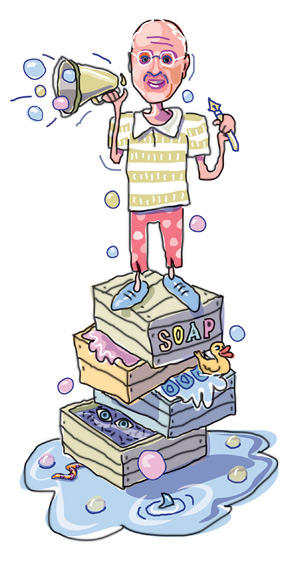
Would you like to see my scar? – Oh, don’t get your knickers in a knot. I’d never deliberately expose the mementos of some surgeon’s handiwork to the eyes of friends, family or unwary bystanders. Goodness knows I have enough visible imperfections without adding any hidden ones to the pile.
But that’s all hypothetical anyway. At my age, I’ve had my share of encounters with the medical profession, but up to this point I’ve managed to avoid being sliced open.
Now, here’s where this story gets difficult. It would be easy if I were with male friends enjoying a Boddingtons. No filter required. Watershed, though, has a mixed gender audience and the terminology I’d employ with my buddies wouldn’t work in this classy publication. But I’ll try.
So, what was wrong? Well, the offending organ is peculiar to the male of the species and becomes problematic for many guys as we age. Let’s clarify that. I’ve read that 50 percent of men over 50 begin to show signs of BPH (benign prostatic hyperplasia aka enlarged prostate) and the incidence rises by 10 percent with each passing decade. So, the bad news, gentlemen, is that if you live long enough, you’ll probably make acquaintances with this annoying and potentially dangerous affliction.
If you’re lucky it’ll never progress beyond the annoying stage. But, guaranteed, you will memorize the location of every public washroom within a 50-kilometre radius of your home. For me, years of watchful waiting ended recently when my urologist confirmed what my symptoms were already suggesting. Time to go in and open things up before a heretofore “benign” condition could do a number on my kidneys. Necessary, but unwelcome news. And the fact that much of my medical information comes from Dr. Google did nothing to ease my apprehension. Enough knowledge to allow you to ask intelligent questions is a good thing, but too much confusing information on the internet can be counterproductive.
There were also all the stories about conditions in our hospitals. Overcrowding, staff shortages, nurses and doctors overworked, exhausted and fed up with everything, cutbacks and Covid have brought their way. I was beginning to have nightmares featuring an endless succession of Nurse Ratcheds and images of Dr. Christopher Duntsch, the infamous Dr. Death, lurking in the background. Factor in the plethora of hospital-acquired illnesses that I’d be flirting with and I was getting really antsy.
Little wonder that on the morning of my surgery, the trek from the parking lot to the hospital felt like I was walking The Green Mile. Once checked in, I was swaddled in hospital regalia and directed to the waiting room where other nervous souls sat awaiting their date with the scalpel. After the call to the operating theatre, everything was a blur until I woke up in the recovery room pain-free but groggy. Before long, I was transferred to the room I shared with a woman on the other side of a curtain. We didn’t exchange a single word during our brief cohabitation; I overheard enough of her conversations to deduce that she was an older woman of refinement. But that veneer of gentility abruptly vanished whenever she nodded off. “Drunken sailor” doesn’t do justice to her various unconscious snorts, and gasps. I feared for her life. How do you distinguish world-class snoring from a death rattle?
After one sleep-deprived night, I was sent packing with several pages of instructions for my at-home self-care. But my relief at being shown the door was no reflection on the care I’d received. Overall, I’d give that place at least an “A”. Maybe even an “A plus”. And it all had to do with the personnel I encountered from check-in to check-out.
Colour me OCD if you will, but I counted the number of staffers I crossed paths with during my stay. Everybody from clerks and receptionists to technicians, custodial staff and, of course, doctors and nurses. Twenty-two people. A’s and A plusses across the board. Not a single Nurse Ratched or Dr. Duntsch in the bunch. I had difficulty reconciling all the negatives I’d heard about working conditions and staff burnout with what I saw on the faces and in the demeanour of those people.
To be sure, all is not well with our hospitals. Emergency room closures are just one manifestation of the cracks in our system. So, yes, I believe that front-line hospital workers are under a lot of pressure. But if my brief exposure to the system is any example, they are handling their stressful jobs with professionalism, grace, and civility. For that, we should be grateful.
And the patient? He’s doing fine. Almost 100 percent. Thanks.
Story by:
George Smith




